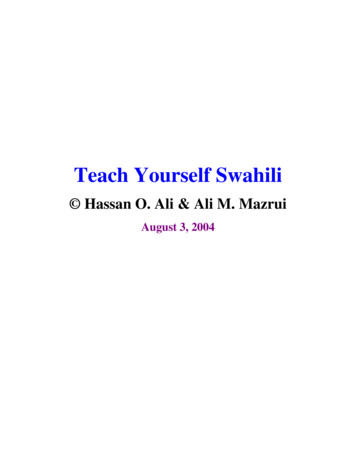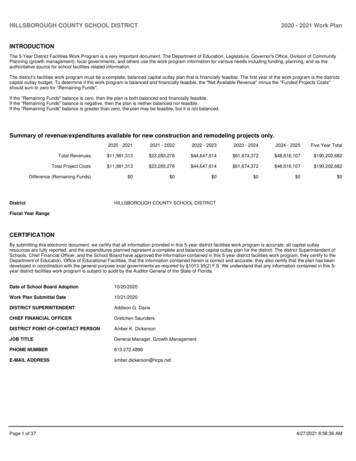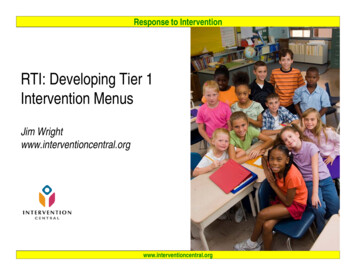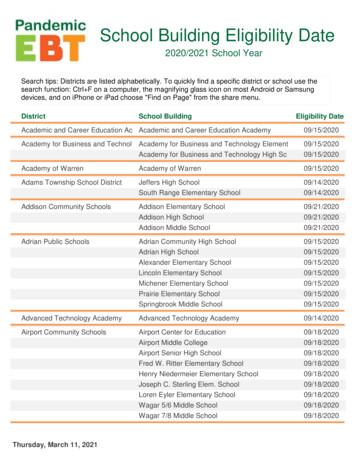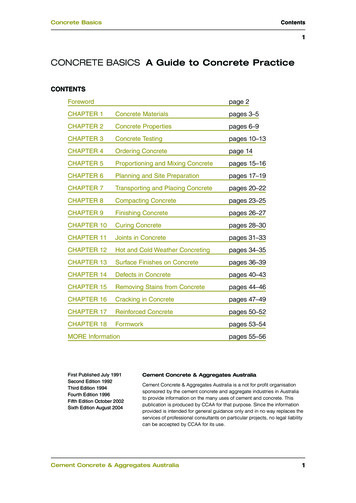
Transcription
ELEMENTARY SWAHILILugha na UtamaduniPeter MwangiNorthwestern University Libraries: Open Textbook Series
ELEMENTARY SWAHILIThis is the development version of the ELEMENTARY SWAHILI.The first edition is slated to be published Summer, 2021.Peter Mwangi. 2020. Elementary Swahili. Evanston: Northwestern UniversityLibraries.This title can be downloaded at: [DOI]Copyright 2020. Peter Mwangi.Published under the Creative Commons Attribution-ShareAlike 4.0 License (CCBY-SA 4.0): N:DOI:Northwestern University Libraries1970 Campus DriveEvanston, IL 60208Disclaimer: Northwestern makes online resources available to all segments ofour community but does not review, edit, or endorse all items accessible fromthese pages. https://www.northwestern.edu/disclaimer.html2
ELEMENTARY SWAHILIContents1.Introduction to Swahili . 5Swahili Alphabets . 6Vowels . 6Consonants. 6Important Words/Prases in Swahili . 72.Salamu za Kiswahili/Swahili Greetings. 9Msamiati/Vocabulary . 9Salamu I: Hujambo . 10Mazungumzo I: Hujambo . 10Mazungumzo II: Hamjambo . 11Sarufi/Grammar: Swahili Pronouns . 11Mazungumzo III . 12Salamu II: Habari Gani?/What is the News? . 12Mazungumzo IV . 12Salamu III: Hujambo?/Habari gani?/Shikamoo?. 13Mazungumzo V: Mwanafunzi na Mwalimu . 13Mazungumzo VI: Mwalimu na Wanafunzi . 14Salamu IV: Mambo?/Mambo vipi?/Sasa?/Niaje?. 14Mazungumzo VII: Mazungumzo ya vijana . 143.Shughuli za Kila Siku/Daily Activities. 16Msamiati/Vocabulary . 16Mazungumzo I: Shughuli za Asubuhi . 17Shughuli za Mchana. 18Shughuli za Jioni . 18Shughuli za Usiku. 19Note on Sarufi/Grammar. 194.Nyakati za Kiswahili/Swahili Tenses . 205.Kumkaribisha Mgeni/Welcoming the Visitor. 23Msamiati/Vocabulary . 23Mazungumzo I . 24Mazungmzo II: Fatuma na Erin . 246.Familia/Family . 26Msamiati/Vocabuary . 263
ELEMENTARY SWAHILIVerbs. 26Possessives . 27Adjectives . 27Mti wa Familia/Family Tree . 28Mazungumzo I: Kusema kuhusu Familia . 28Possessives in Swahili. 29Mifano/Examples . 30Swahili Adjectives . 307.Kazi/Occupation . 32Msamiati . 32Kusema kuhusu familia na kazi. 338.Familia, Nchi, Uraia, na Lugha/Family, Country, Nationality, and Language. 34Unatoka Wapi na Unaishi Wapi?/Where Are You From and Where Do You Live? . 369.Nina Lakini Sina/I have but I do not have . 37Msamiati/Vocabulary . 37Kuuliza/Inquiring . 37Mifano katika sentensi: . 3810. Ninapenda lakini sipendi/I Like but I Do Not Like . 39Msamiati/Vocabulary. 39Mifano. 4011. Je, Unasoma Wapi?/Where Do You Study?. 42Msamiati/Vocabulary . 42Mazungumzo I: Neema na Erin wanakutana katika kongamano la masomo ya Kiafrika. 4312. Nambari/Nominal Numbers . 46Msamiati/Vocabulary . 46Ordinal Numbers. 554
ELEMENTARY SWAHILI1.Introduction to SwahiliSwahili or Kiswahili is a bantu language that is spoken in East Africa/AfrikaMashariki. It is both a national and official language in Kenya and Tanzania andis the official language of the East African Community member states whichinclude: Kenya, Tanzania, Uganda, Rwanda, Burundi, and South Sudan. Swahiliis spoken in other African countries such as Democratic Republic of Congo(DRC), Mozambique, and the Comoros Islands. It is also taught in Ghana, SouthAfrica, Zimbabwe, and many countries outside Africa. In the U.S. Swahili is theleading sub-saharan African language that is taught in colleges and universities.Can you identify the East African countries that use Swahili on the map below?What do you think is the importanceof having Swahili as a nationallanguage in Kenya and Tanzania?What is the population of Kenya andTanzania? Can you calculate thepopulation in East Africa that at leastspeaks Swahili based on thepopulation of the two countries?Swahili is used as a language ofinstruction in Tanzania up to highschool but taught as a subject atschools in other East Africancountries.The Swahili speakers have interactedwith many speakers of otherlanguages over a long period of time.For this reason, Swahili hasborrowed words from some of theselanguages, especially Arabic. Swahiliuses Roman alphabets and is writtenfrom left to right. However, there are certain English alphabets that do not exist inSwahili and there are a couple of Swahili alphabets that are not in English.Swahili is an agglutinative language and for that reason, a verb can be asentence on its own because it may contain all the grammatical elements of aSwahili sentence. Further, Swahili is spoken the way it is written and written theway it is spoken.5
ELEMENTARY SWAHILISwahili AlphabetsVowelsLetterSwahiliEnglishAamkaget d luckKhkherigood luckJjaabecome onsonants6
ELEMENTARY melNg’ng’ombecowNynyanyatomato or grandma peopleYyayababysitterZzawadigiftImportant Words/Prases in SwahiliHere is a list of words that you will mostly need to use while learning Swahili.SwaliQuestionJibuAnswerAsanteThank youKaribuWelcomeTafadhaliPleaseTafadhali sema tenaPlease say it againSijuiI do not knowSamahaniI am sorry or excuseme7
ELEMENTARY SWAHILIUmeelewaDo you understand?SielewiI do not understandNdiyoYesHapanaNoNimesahauI have forgottenSiwezi kukumbukaI cannot rememberPoleSorryMwalimuTeacherSawaOkSawaNot okSamahani, naomba kwenda msalani, nje .Excuse me, I would like to go to the bathroomoutside, etcUnasemaje X kwa Kiswahili?How do you say X in Swahili?8
ELEMENTARY SWAHILI2.Salamu za Kiswahili/Swahili GreetingsSwahili greetings depend on the age of the participants, time of the day, and thecontext (formal or informal). Swahili greetings tend to be long and are usuallyinitiated by the young persons to the older ones although the vice versa doeshappen.Msamiati/VocabularyHabarinewsNzuri, salama, safi,njemafineHabari za X, Y, ZNews of X, Y, ZAsubuhimorningMchanaday ifriendMbwadogPakacatNyumbanihomeHujamboHow are you?SijamboI am fineX hajambohow is he or she?HajamboHe or she is fineX na Y hawajamboHow are X and YHawajambothey are finesinaI do not haveKwaheriGoodbye (1)9
ELEMENTARY SWAHILIKwaheriniGoodbye allShikamooAsanteniThank you alla respectful greeting used by a youngperson to an older personMarahabaResponse ofshikamooItwacalledjina langu niMy name isNinaI haveMambo?; Sasa?; Niaje?; Mambo vipi?; Vipi?Poa, freshi, safiWhat's Up?coolSalamu I: HujamboHujambo is one of the most common greetings in Swahili. It is usually usedamong agemates. However, if someone who is older than you greets you usinghujambo, you respond to the greeting word and greet them back using an ageappropriate greeting that we shall learn.Mazungumzo I: HujamboAsha:Hujambo, Ali?Ali:Sijambo, Asha. Na wewe je, hujambo?Asha:(Mimi) sijambo.Ali:Kaka hajambo?Asha:(Yeye) hajambo. Je, dada hajambo?Ali:Hajambo pia.Asha:Kwaheri Ali.Ali:Kwaheri Asha.Zoezi I: HujamboIn pairs, practice to greet in Swahili using jambo10
ELEMENTARY SWAHILIMazungumzo II: HamjamboAli:Hamjambo Asha na Jamila?A & J:(Sisi) hatujambo Ali. Wewe hujambo?Ali:(mimi) sijambo. Baba na mama hawajambo?A & J:(wao) hawajambo, asante. Je, dada zako hawajambo?Ali:(wao) hawajambo. Kwaherini.A & J:Kwaheri, tutaonana baadaye.Zoezi II: HamjamboIn groups of 3s, practice to greet in Swahili using hamjambo.Sarufi/Grammar: Swahili PronounsYou may have noticed that the jambo greeting changes depending on how manypeople are involved. The participants are indicated in the brackets inmazungumzo II above. There are 3 personal pronouns that exist both in singularand plural. The pronouns are also marked in verbs to make them grammarticalas shown in the table below.PersonPronounPronoun and Verb itwa/called1stMimi /me or IMimi ninaitwa Asha2ndWewe /youWewe unaitwa Ali3rdYeye /him or herYeye anaitwa Jamila1stSisi/us or weSisi tunaitwa Wildcats2ndNyinyi/ you allNyinyi mnaitwa Buckeyes3rdWao/theyWao wanaitwa SpartanSingularPlural11
ELEMENTARY SWAHILIMazungumzo IIIBaraka:Hujambo rafiki?Pili:Sijambo rafiki. Mimi ninaitwa Pili. Na wewe je, unaitwa nani?Baraka:Mimi ninaitwa Baraka. Nimefurahi kukufahamu, Pili.Pili:Nimefurahi kukufahamu pia, Baraka. Je, unatoka wapi?Baraka:wapi?Mimi ninatoka Dar es Salaam, Tanzania. Na wewe je, unatokaPili:Mimi ninatoka Mombasa, Kenya.Baraka:Kwaheri Pili.Pili:Kwaheri Baraka.Zoezi III: NinaitwaIn pairs, greet each other and introduce yourselves in Swahili.Salamu II: Habari Gani?/What is the News?The habari? habari gani? greeting is also a general form of greeting in Swahili.Just like with hujambo, it is mostly used among agemates. If an older persongreets a younger person using the habari greeting, the younger person respondsto the habari greeting and then greets the older person using the age appropriategreeting, shikamoo. The response to the habari greeting can either be nzuri,njema, salama, or safi, all which translate to fine or good. Just like with hujambogreeting, you can use the habari to inquire about the state of affairs of the personwhom you are greeting such as work, school, pet, family, e.t.c.Mazungumzo IVBahati:Habari gani rafiki yangu?Musa:Salama rafiki, jina langu ni Musa; ninatoka Nairobi, Kenya.Bahati:asubuhi?Mimi ninaitwa Bahati; ninatoka Arusha, Tanzania. Habari zaMusa:Nzuri sana na wewe je?Bahati:Safi. Habari za safari?12
ELEMENTARY SWAHILIMusa:Njema. Nyumbani hawajambo?Bahati:Hawajambo.Musa:Karibu Nairobi.Bahati:Asante.Musa:Ninakutakia siku njema.Bahati:Asante, ninakutakia siku njema pia.Zoezi IV: HabariIn pairs, greet each other using habari/habari gani greeting, introduceyourselves, and bid each other goodbye.How would you greet someone in Swahili using the habari greeting at thefollowing times of the day? AsubuhiMchanaJioniUsikuHow would you bid one goodbye in Swahili at the different times of theday shown below? AsubuhiMchanaJioniUsikuSalamu III: Hujambo?/Habari gani?/Shikamoo?In this section, we shall learn how to use the shikamoo greeting together withhujambo and habari greeting words. Shikamoo is used by a young person to anadult, professor, or parent figure.Mazungumzo V: Mwanafunzi na MwalimuMwanafunzi:Shikamoo mwalimu.Mwalimu:Marahaba. Hujambo?Mwanfunzi:Sijambo, mwalimu. Habari za mchana?Mwalimu:Salama, asante. Nyumbani hawajambo?13
ELEMENTARY SWAHILIMwanafunzi:Hawajambo.Mwalimu:Karibu kiti.Mwanafunzi:Asante sana, mwalimu.Mazungumzo VI: Mwalimu na WanafunziMwalimu:Hamjambo wanafunzi?Wanafunzi:Hatujambo mwalimu, shikamoo?Mwalimu:Marahaba. Habari za asubuhi?Mwanafunzi I:Salama, asante.Mwanafunzi II:Njema.Mwanafunzi III:Nzuri sana.Mwalimu:Karibuni ofisini.Wanafunzi:Asante sana, mwalimu.(baada ya mazungumzo/after the conversation)Mwalimu:Kwaherini na muwe na siku njema.Wanafunzi:Kwaheri na uwe na siku njema pia.Zoezi V: Kazi ya VikundiIn pairs, rehearse how you will initiate a Swahili conversation with yourSwahili instructor during the office hour by using the age and timeappropriate greetings.Salamu IV: Mambo?/Mambo vipi?/Sasa?/Niaje?In this section, we shall focus on the informal greetings that Swahili speakers usein their informal interactions. You can use any of the following greeting words ininformal greetings: mambo?, mambo vipi?, sasa?, or niaje?, all which translate towhat’s up?/how is the going? The following responses are used interchangeably:poa, freshi, or fiti, all which translate to cool.Mazungumzo VII: Mazungumzo ya vijanaJuma:Mambo vipi Tatu?Tatu:Freshi! Niaje?14
ELEMENTARY SWAHILIJuma:Poa sana. Za mchana?Tatu:Safi! Mambo yanakwendaje?Juma:Salama na wewe je?Tatu:Freshi! Baadaye.Juma:Baadaye.Zoezi VI: Kazi ya VikundiIn pairs, practice to use informal Swahili greetings.15
ELEMENTARY SWAHILI3.Shughuli za Kila Siku/Daily ay time(afternoon)JionieveningUsikunightamkawake upogashowerNawa usowash facenawa mikonowash handssugua menobrush teethTayarishapreparevaa nguowear clothesvaa viatuwear shoesChakula chaasubuhibreakfastchakula chamchanalunchchakula chausikudinnerKiamsha kinywabreakfastKunywato drinkkulato eatAngalia simucheck the phonefanya mazoeziwork outenda chuonigo to schoolSomareadpumzikarest or relaxrudi nyumbanigo back homeChezaplaypikacookona televisheniwatch tvZungumza namarafikichat with friends16
ELEMENTARY SWAHILItembeawalkKimbiaruntembeza mbwawalk dogendesha baiskeliride a bikeOna filamuwatch a filmcheza michezoya videoplay video gamesFanyadokawaidausuallymara kwa maraoccasionallyChokabe tiredlakinibutmapemaearlyMazungumzo I: Shughuli za AsubuhiRajabu:Mambo Pendo!Pendo:Poa! Za asubuhi?Rajabu:Freshi lakini nimechoka kidogo.Pendo:Pole kwa kuchoka. Je, wewe hufanya nini kabla ya darasa?Rajabu:Asante. Kawaida, mimi huamka mapema, husugua meno, hunawauso, hufanya mazoezi ya futiboli ya Marekani, hurudi chumbani,huoga, hula chakula cha asubuhi, na huenda darasani. Na weweje?Pendo:Lo! Unafanya mambo mengi sana. Mimi kawaida huamka,huangalia simu, husugua meno, hunawa uso, humtembeza mbwa,husikiliza muziki, hujitayarisha, na huenda chuoni kwa basi.Rajabu:Una bahati sana! Siku njema rafiki yangu.Pendo:Asante. Siku njema pia.Zoezi I: Shughuli za AsubuhiPamoja na rafiki, sema wewe hufanya nini asubuhi kabla ya darasa.Zoezi II: Shughuli za Mchana, Jioni, na Usiku17
ELEMENTARY SWAHILIWith a friend, fill out the venn diagrams below with what each of you doesat the different times of the day shown below and what both of you do incommon in the intersection.Shughuli za MchanaShughuli za Jioni18
ELEMENTARY SWAHILIShughuli za UsikuNote on Sarufi/GrammarYou might have noticed that we have attached a prefix hu- to the verbsdescribing the activities that we perform at different times of the day. Prefix huindicates the habitual tense. In the next topic, we shall explore how differenttenses in Swahili are marked.Zoezi III: Scenario19
ELEMENTARY SWAHILIYour potential host family in East Africa would like to have an idea of howyour normal weekday looks like. Please use the table below to providethem with the information they have requested from ku4.Nyakati za Kiswahili/Swahili TensesSwahili has the following major tenses: past, present, future, past perfect, andhabitual tense. Each of these tenses has a marker that is attached to the verb.With the exception of the habitual tense marker all the other markers areattached after the subject/personal pronoun marker. Thus, the Swahili verbalstructure will look as follows for now.20
ELEMENTARY SWAHILISubject Marker (SM) Tense Marker (TM) Verb (V)The different markers that are used for different tense markers are as follows.Past tense -li-Present tenseMimi nilisoma -na-Wewe unasomaFuture tense -ta-Yeye atasomaPast perfect -me-Sisi tumesomaHabitual tense hu-Nyinyi husomaZoezi I: Swahili Personal PronounsFill the table given below of Swahili pronouns and their ezi II: Swahili Tenses and Daily ActivitiesFill the table given below of Swahili tenses and daily activities by attachingthe personal pronoun markers and tense markers to the verb given ineach row.PersonPast (-li-)MimiamkaPresent (-na-)Future (-ta-)Habitual(hu-)Pastperfect (me-)21
ELEMENTARY amshakinywaendachuoniZoezi III: Talking about Daily Activities Using DifferentTenses Je, kawaida wewe hufanya nini kabla ya darasa?Je, utafanya nini baada ya darasa?Je, ulifanya nini jana jioni?Je, utafanya nini leo jioni?Je, ulifanya nini wikendi jana?Je, utafanya nini wikendi hii?22
ELEMENTARY SWAHILI5.Kumkaribisha Mgeni/Welcoming the VisitorIn many communities in East Africa, people visit each other with or without anotice. Culturally, the host is expected to welcome the guest/visitor by servingthem with tea and food. On the other hand, it would be considered rude for thevisitor not to accept what they are served. Guests request to be allowed into thehouse by saying, “hodi!” which can either be accompied by a knock on the dooror not.Msamiati/VocabularyHodi!May I come in?KaribuwelcomeAsantethank ckkwa hiyo auhivyotherefore23
ELEMENTARY SWAHILIMazungumzo IMgeni:Hodi! Hodi!Mwenyeji:Karibu! (baada ya kufungua mlango). Karibu ndani.Mgeni:Asante. Shikamoo mama. Jina langu ni Erin.Mwenyeji:Marahaba. Hujambo? Mimi ninaitwa Mama Fatuma. Karibu kiti.Erin:Sijambo. Asante sana, Mama Fatuma.Mama F:Hamna shida. Habari za safari?Erin:Nzuri sana lakini imekuwa ndefu sana.Mama F:Pole kwa safari. Habari za familia?Erin:Salama sana.Mama F:Baba na mama hawajambo?Erin:Hawajambo.Mama F:Vizuri sana. Kaka na dada je hawajambo?Erin:Hawajambo pia.Mama F:Karibu Kenya.Erin:Asante sana. Fatuma yuko wapi?Mama F:Yeye anasoma maktabani lakini atarudi karibuni. Je, utaogakwanza ama utakunywa chai?Erin:Naomba kuoga kwanza.Mama F:Sawa. Nitakuonyesha bafu ilipo.Erin:Asante sana, mama.Zoezi I: Mazungumzo na baba/mama wa Afrika MasharikiWith a partner, rehearse a conversation that you would have with yourhost mom/dad upon your arrival in East Africa.Mazungmzo II: Fatuma na ErinFatuma:Mambo Erin!24
ELEMENTARY SWAHILIErin:Poa. Habari gani?Fatuma:Safi sana. Karibu Nairobi!Erin:Asante sana dadangu. Habari za masomo?Fatuma:Nzuri kabisa lakini nina wasiwasi wa mitihani wiki kesho. Habari zafamilia?Erin:Bahati njema katika mitihani. Familia haijambo. Nimependanyumbani kwenu sana!Fatuma:Asante. Ungependa kufanya nini leo jioni?Erin:sana.Karibu dadangu. Labda nitalala mapema kwa sababu nimechokaFatuma:Naelewa. Pole kwa safari.Erin:nafasi.Asante, lakini kesho ningependa kwenda mjini kama utakuwa naFatuma:mjini.Bila shaka. Kesho sina madarasa, kwa hiyo tunaweza kwendaErin:Asante. Nitaenda kulala sasa.Fatuma:Karibu na usiku mwema.Erin:Usiku mwema pia.Zoezi II: Mazungumzo na kaka au dada wa Afrika MasharikiIn pairs, rehearse a conversation that you might have with your hostbrother or sister in East Africa.25
ELEMENTARY SWAHILI6.Familia/FamilyIn many African families, the grandparents live together with one of their children.For this reason, we shall include them in the family tree of a typical immediatefamily in East Africa shown below.Msamiati/VocabuaryBabugrandfatherbibi (Tanzania)au adasisterbaba mkubwa aumdogouncle (dad'sbrother)Mama mkubwaau mdogoaunt (mom'ssister)shangaziaunt (dad's sister)BinamucousinndugusiblingVerbs-pendalike or lovesipendiI do not likehapendihe or she does notlikesomaread or studytokacome fromishiliveku ( verb)to (infinitive verb)NinaI haveUnaYou haveanahe or she hasTunawe havemnayou all have26
ELEMENTARY SWAHILIwanathey havesinaI do not havehunayou do not havehanaHe or she does nothavehatunawe do not havehamnayou all do not havehawanaThey do not havePossessives-angumine-akoyours-akehis or hersours-etu-enuyours (all)-aotheirs-kubwabig or elder-dogosmall or es27
ELEMENTARY SWAHILIMti wa Familia/Family TreeMazungumzo I: Kusema kuhusu FamiliaMimi nina familia kubwa.1. Huyu ni babu yangu, baba wa baba, yeye anaitwa Juma. Yeye anatokaKenya na anaishi katika mji wa Naivasha Kenya. Yeye anapendakutembea na kulima, lakini hapendi kusafiri.2. Huyu ni bibi yangu, mama wa baba, yeye anaitwa Tatu. Yeye anatokaKenya na anaishi katika mji wa Naivasha pia. Yeye anapenda kupika nakufuma, lakini hapendi kulima.3. Huyu ni babu, baba wa mama, yeye anaitwa Yohana lakini aliaga. Yeyealitoka Kenya katika mji wa Kisumu. Alipenda kusoma gazeti sana.4. Huyu ni bibi, mama wa mama, yeye anaitwa Achieng’. Yeye anatokaKenya na anaishi katika mji wa Nairobi. Yeye anapenda kufuma nakwenda kanisani, lakini hapendi kuishi mashambani.28
ELEMENTARY SWAHILI5. Huyu ni baba yangu. Yeye anaitwa Mbogo. Babangu anatoka Kenya naanaishi katika mji wa Nakuru. Yeye anapenda soka sana lakini hapendikuogelea.6. Huyu ni mamangu. Yeye anaitwa Zawadi. Mamangu anatoka Kenya naanaishi katika mji wa Nakuru pia. Yeye anapenda kupika na kununua,lakini hapendi kulima.7. Kakangu mkubwa anaitwa Juma, kama babu yangu. Yeye anasomakatika Chuo Kikuu cha Nairobi. Yeye anapenda kusoma na kusafiri, lakinihapendi kuogelea.8. Dadangu anaitwa Tatu, kama bibi yangu. Yeye anasoma katika ChuoKikuu cha Dar es Salaam, Tanzania. Yeye anapenda muziki na sanaa,lakini hapendi kupika.9. Kakangu mdogo anaitwa Mambo. Yeye anasoma katika shule yasekondari katika mji wa Nakuru. Kwa hiyo, anaishi pamoja na wazaziwangu. Yeye anapenda kucheza soka na kukimbia, lakini hapendikununua.10. Mimi ninaitwa Yohana, kama babu yangu. Ninatoka katika mji wa Nakuru,Kenya, lakini sasa ninaishi katika Mji wa Evanston, IL. Ninapendakutazama filamu na kuendesha baiskeli, lakini sipendi kuogelea.Zoezi I: Familia YanguDraw a family tree of your immediate family.Follow the examples given above to talk about members of your family.Possessives in SwahiliHere, we shall learn how to use the possessives in Swahili based on the Swahilipersonal pronouns as 3rd-ake-ao29
ELEMENTARY SWAHILIMifano/Examples1. Mama yangu anapenda kupika.2. Mama yetu anapenda kupika pia.3. Dada yako anaitwa nani?4. Kaka yenu anaitwa nani?5. Rafiki yake anatoka wapi?6. Rafiki zao wanatoka wapi?Zoezi II: PossessivesIn pairs, use examples of Swahili possessives to talk about members ofyour families.Swahili AdjectivesAll Swahili nouns are categorized into specific groups called noun classes. Eachnoun class has both the singular and plural form. The noun class for animatebeings belongs to the M/WA noun class(es). M indicates singular while WAindicates the plural form. These markers are used to mark the adjectives also.The verbs in M/WA take the subject marker (noun class marker) a- in singularand wa- in plural. Look at the examples below.Zoezi III: AdjectivesFollow the examples shown in the table below to fill in the blanks ofpossissives, adjectives , and verbs by attaching the appropriate markers.NounClassNoun cheza (play)WAMWAM30
ELEMENTARY anguzuripika a-dadaenurembosoma
Mwalimu: Kwaherini na muwe na siku njema. Wanafunzi: Kwaheri na uwe na siku njema pia. Zoezi V: Kazi ya Vikundi In pairs, rehearse how you will initiate a Swahili conversation with your Swahili instructor during the office hour by using the age and time appropriate greetings. Salamu IV: Mambo?/Mambo vipi?/Sasa?/Niaje?

